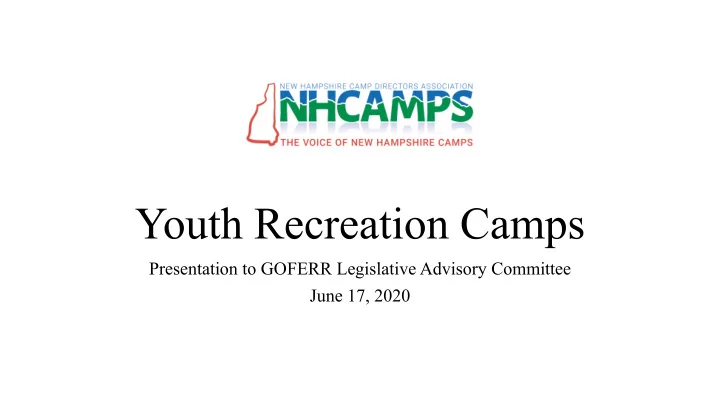

NEW HAMPSHIRE CAMP DIRECTORS ASSOCIATION NHCAMPS Youth Recreation Camps Presentation to GOFERR Legislative Advisory Committee June 17, 2020
Economic Impact of NH Camps Data from American Camp Association 2016 Economic Impact Study Licensed Youth Recreation Camps: 160 Full-Time Employed: 300 Seasonal Employed: 5,500 Payroll: $32,210,000 Operating Expenses: $88,210,000 Capital Expenses: $17,250,000 Visitor Spending: $7,560,000 Direct Contribution to NH Economy: $113,030,000
Populations Served Data from New Hampshire Camp Directors Association 2008 Economic Impact Study PROGRAM PARTICIPANTS served: 148,626 NH Program Participants: 66,712 (45%) FAMILIES represented in camp population: 72,771 NH Families: 37,064 (51%) Approximately 1 in 3 children in NH ages 5+ are served annually by a licensed Youth Recreation Camp
2020 State of NH Camps As of June 14, 2020 DAY CAMPS 46% are closed – 35 camps remain hopeful to open RESIDENT CAMPS 91% are closed – 9 camps remain hopeful to open Camps that have not yet closed may yet due to the challenges presented by state guidelines for safe operation.
2020 Financial Impact Survey of all Youth Recreation Camps as of June 14, 2020 – 74 of 160 licensed camps responding 82% DROP IN GROSS REVENUE (estimated $120M – $150M) Estimate an additional 6-10% unrealized 2021 revenue from 2020 tuition deposits carried over to 2021 47% REDUCTION IN OPERATING EXPENSES Camps cannot reduce expenses equivalent to lost revenue; decreasing part-time and seasonal payroll is one of the most substantial cost-saving measures available. LIMITED OPPORTUNITIES TO RECOVER FROM 2020 LOST REVENUE Camps typically do not collect tuition until spring before summer season; expenses (property taxes, full-time payroll, utilities, insurance, etc.) remain constant year-round
Camps Have Unique Needs 17% of surveyed camps reported “likely” or “somewhat likely” to not re-open in 2021 without financial support. In some cases, operating under 2020 Covid-related guidelines is more costly than not opening due to overall population limits, testing requirements, etc. Preparing to meet guidelines in 2021 for a post-Covid environment will be costly – improved healthcare facilities, added sleeping quarters, cleaning and disinfecting supplies, added staff, etc. The typical financial cycle for camps cannot survive a season of lost revenue – fall, winter, and spring expenses depend on summer income.
Camps are Essential The need for the social and emotional development that camps provide is heightened after a lost summer and a year living with the impact of the Covid pandemic. Camps deliver a substantial community benefit, teaching environmental education and stewardship, citizenship, self-reliance, independence, and character. As NH emerges from this crisis, camps will play a critical role in helping children successfully reintegrate into society. Funding that sustains camp through 2020 and 2021 will be returned directly to the New Hampshire economy in the form of normal operating expenses and necessary improvements in anticipation of post-Covid operation.
Thank You Your support is appreciated. Ken Robbins President, New Hampshire Camp Directors Association https://nhcamps.org Director, Camp Kabeyun, Alton Bay https://kabeyun.org ken@kabeyun.org (603) 875-3060
Recommend
More recommend